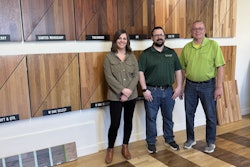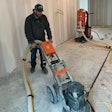I've worked in wood flooring since a very young age, eventually starting my own company back in 2001. We've been fortunate to grow from being a typical one- or two-man operation to having eight well-trained crews and a showroom serving a high-end market.
One of the key reasons we've been able to that is because I do something I feel can be uncommon in the wood flooring business: On estimates, I take my time and tell the customer the truth.
Telling the truth shouldn't be unusual, but a good example of this happened recently: We were called out to do an estimate at an existing home in a high-end neighborhood, and when we got the job-four months later-the customer told me he had gotten estimates from 14 other wood flooring contractors (yes, that was 14 other contractors) and even brought back samples from California when he was back home visiting family there. We ended up doing 1,800 square feet of flooring and a staircase and have an estimate out to do three more rooms.
Why did we get the job? I'll tell you:
I took my time. This estimate lasted at least an hour and a half. Typically my estimates don't take that long unless there's a lot of custom layout to discuss, because usually the customer has already been in our showroom and understands our level of customer service and quality. But this customer and his wife sat there with pen and paper and took notes the entire time we were talking. He had particular ideas about what he wanted, which leads us to ...
I gave him what he wanted. This gentleman appreciates details. His house is immaculate; he and his wife are empty nesters and spend a lot of time taking care of their home. There were three transition areas on this job where the existing tile was going to be about a quarter-inch higher than the wood flooring. He wanted to have a flat transition there. Other contractors had told him, "No, that can't be done." They had suggested using a T-molding or some other kind of molding there. I explained to him how we could float it back into the room and do it far enough that we would still meet NWFA restrictions for flatness for the slab. At that point they already knew about the requirements for making the slab flat because ...
I discussed the unknown. I told them there were two factors that could affect the price of their job, and I couldn't give them an exact price right away unless we did some testing and removed all the carpeting. One reason was to check the flatness of the concrete so we would know whether that was going to be an issue, and the other was checking for moisture so we would know if we had to use a moisture control system in lieu of our normal gluing process (and if so, what type of system would be needed to control the excess moisture).
After we got the job, he told me we were the only company out of 14 contractors that discussed the potential for moisture.
After we got the job, he told me we were the only company out of 14 contractors that discussed the potential for moisture. Moisture isn't an exciting thing to talk about, but it is one of those things that ruins a job. Even here in the desert, we do have cases where moisture is going to be an issue. Customers may be disappointed they have to pay a little more for the moisture barrier, but when it happens, we don't have customers who are mad or surprised, saying, "Why are you telling me this now?"
I was confident. Around the time I started my company was when I started getting involved in the National Wood Flooring Association and learning the proper way to do things. I had been in the business my whole life, but I hadn't been taught the right techniques for installing, sanding and finishing. On this job, other contractors hadn't been able to answer all his questions about some of the technical details; some even said they would have to ask their installers and get back to him. That tells me they were subbing out the work.
The homeowner was hearing so many things that didn't make sense, he ended up talking with the manufacturer of the flooring, and we were the only company that had told him the same information as the manufacturer.
When you educate yourself, that gives you an air of confidence when you walk into a potential project. On every single project I walk into, I feel like I'm going to get the job, and I talk about it that way. I use language like, "When we're here...," and that rubs off on the customer. I used that language while ...
I walked them through the job. When I'm on an estimate, I break down the whole process: This is what we're going to do with your furniture, this is what you need to plan for, this is how long we'll basically own your home and you need to go someplace else while we're finishing.You can't come in on Monday and tell them they can't stay there that night.
I priced my job for profit. That sounds obvious, but how many guys do you know doing work for time and materials? You need to make a profit, especially if you want to grow your business.
People want the best quality floor, the best customer service and the best installation. You can't be all three of those things and be the cheapest in town. If I tried to match other guys' pricing, I'd have to cut corners, like paying my installers less, and that would mean I'd be sacrificing quality. My business is my honor, my name-whether I'm on the job myself or my employees are, I want that floor to look like I installed it myself.
On this job, one contractor told the homeowners he didn't carry floors more expensive than a certain amount because in our area you just can't sell flooring that costs that much money. That is not the case; in our showroom we have some very expensive floors. In fact, this customer happens to be from California, where everything is more expensive, and he thought to get his money's worth he had to spend more money. He specifically told me he didn't want a wood floor like his neighbor's, which he said looked "junky."
After our job was over—we ended up installing a high-end, random-width engineered plank floor that was hand-scraped—he told me he was willing to pay $4 more per square foot than what we charged! When I stopped to pick up final payment and do a final walkthrough on the job, I told him if I had known he wanted to spend more, I could have done that for him.































